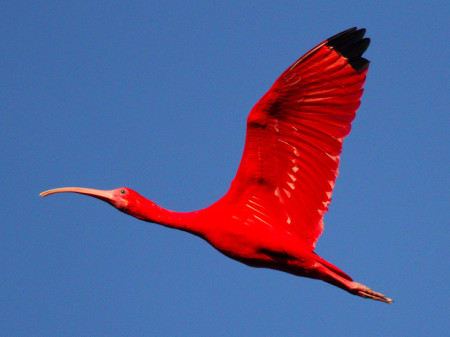
Flying low over the water and glowing brilliant red in the light of the setting sun, thousands of Scarlet Ibis quietly assemble at their roosting site. While the Tricolored Herons and bright white Snowy Egrets disappear into the cover of the mangroves, the Scarlet Ibis remain perched on top, dotting the dark green with intense bursts of red. To witness this spectacular ritual— a daily occurrence in the Caroni Swamp in Trinidad—is to experience one of the most extraordinary events in the natural world.
The Scarlet Ibis (Eudocimus ruber) is both culturally and economically important to the twin island nation of Trinidad and Tobago. When the country gained independence in 1962, it was fitting to declare the Scarlet Ibis as the national bird and it is featured prominently on the nation’s coat of arms and one dollar bill. Since at least the early 1970s, bird-watching ecotours in Caroni Swamp were generating over $1 million TTD annually. Today, the swamp and the ibis are internationally known as a “must-see” natural treasure, and the ecotourism industry continues to support the livelihoods of many Trinidadians.
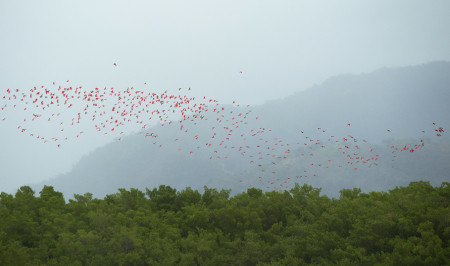
Unfortunately, the Scarlet Ibis is also coveted for another reason: its meat. In an interview last month, the Chief Game Warden acknowledged that the bird is a black market delicacy illegally served at elite parties, driving the motivation for poaching. It has been speculated that eating the national bird is a status symbol. In 2013, a man with 18 ibis carcasses was sentenced to 18 months in prison (though he was allowed to serve them concurrently). And just this summer, three people were arrested in the possession of ibis carcasses and blasted on social media by Agriculture, Lands and Fisheries Minister Clarence Rambharat. His comments were widely shared and sparked dozens of newspaper articles, with the outraged public calling for action.
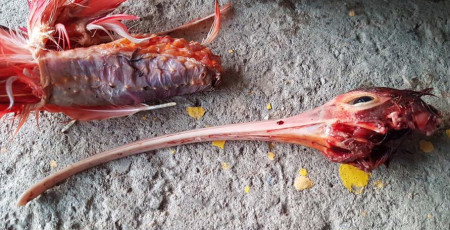
The national bird has a long history of persecution and is incredibly sensitive to disturbance. As early as the 1860s, colonial records warn that “a fierce war has been made on this bird…already it comes in fewer numbers and soon it will be very rare.” Other reports from the early 1930s and 1950s acknowledge that the Scarlet Ibis are “shot ruthlessly for food or so-called sport” and that they are very wary as a consequence. Richard ffrench, the neotropical ornithologist based in Trinidad, noted that in the beginning of the 20th century, hunting prevented the Scarlet Ibis from breeding on the island until 1953.
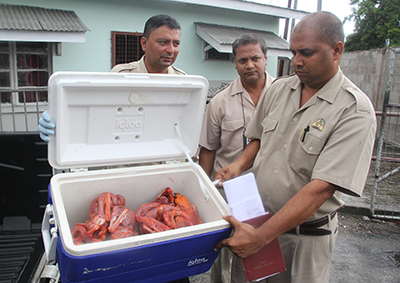
Currently, the fine for hunting or possessing the Scarlet Ibis is just $1,000 TTD (~$150 USD) or three months in prison. But due to the vast expanse of the Caroni Swamp and limited manpower, enforcement is difficult. In 2010, six individuals were fined $750 TT each for poaching offences that took place in 2007. Surprisingly, this marked the first time in the country’s history that someone was convicted of hunting the Scarlet Ibis.
Minister Rambharat has petitioned the Environmental Management Authority (EMA) to initiate the process to change the designation of the Scarlet Ibis to an Environmentally Sensitive Species (ESS). Under this protected status, poachers could receive a maximum of a $100,000 TTD fine or up to two years imprisonment. An ESS status would also facilitate interagency and joint patrols in Caroni Swamp, increasing warden and police presence. In addition, the EMA is exploring changing the status of the Caroni Swamp to an Environmentally Sensitive Area (ESA). The swamp is already designated a Ramsar site (1993) and a Prohibited Area under the Forests Acts.
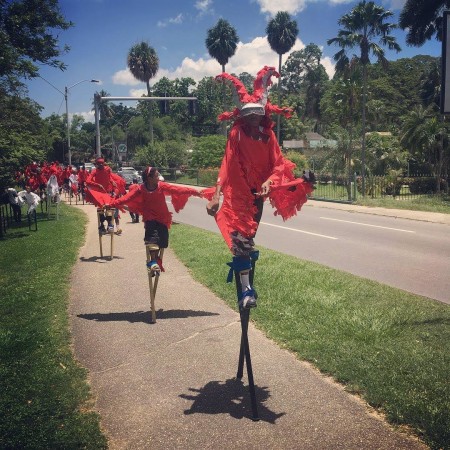
Even young Trinidadians are raising awareness about the poaching of the national bird. In August, 45 performers aged 9-17 years old from the Moko Jumbie Cultural Camp dressed as Scarlet Ibis and marched in the capital’s Queen’s Park Savannah. This Caribbean stilt-walking art form is common during carnival season, and the camp’s mission is to preserve this custom and create cultural legacies by engaging children. It was a fantastic idea to combine this unique cultural heritage with the natural heritage of the Scarlet Ibis! Click here to see the video.
What you can do to help:
- Please spread the word that the EMA is requesting information (including observations), research, or data about the Scarlet Ibis to assist with changing its status to an ESS. Information can be submitted here.
- The mandatory 30-day public comment period for the change in status to ESS will be announced shortly. Please check the EMA website or Facebook page for updates and send a letter in support of this change in protected status.
Please scroll over or click on the photos for captions
Jessica Rozek is a PhD student at Tufts University, where she is focusing her research on Caribbean wetland conservation and human-wetland-bird interactions. Learn more about her research here.








